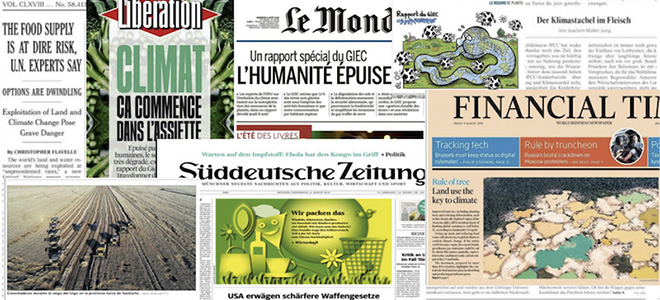
Reporting on latest science around climate change and land use focused on rich nations’ eating habits, but did it miss the bigger picture?
The Intergovernmental Panel on Climate Change is widely regarded as the gold standard of climate science. But is the world’s media paying attention to it?
Last week’s IPCC report on land use may not have turned out to be the headline-generating machine that the 2018 report on limiting warming to 1.5C was; nor did it go unnoticed. The scope for stories was wide, with co-chair Jim Skea telling Climate Home News the paper was “the most complicated thing I’ve ever been involved with”.
While some journalists picked up on trade-offs between carbon storage and food production, the importance of indigenous land rights or sustainable farming practices, one theme dominated: meat.
Led by western media, the majority of coverage focused on the environmental impact of readers’ steak habits – even in countries where vegetarian diets are dictated by financial constraints or spiritual practice, not consumer preference.
Despite being the first IPCC report with a majority of authors from the developing world, few news outlets in poorer countries dedicated space to it. What little reporting filtered through was largely based on the IPCC press release or newswire copy, rather than highlighting the stark implications of the science for vulnerable communities.
AFP led with “Can we eat Big Macs and still avoid climate chaos?”, summarising that “not everyone needs to become a vegetarian, much less vegan, to keep the planet from overheating, but it would probably make things a lot easier if they did.” Reuters also attempted to capture that nuance, writing “although the report stopped short of explicitly advocating going meat free, it called for big changes to farming and eating habits to limit the impact of population growth and changing consumption patterns on stretched land and water resources.”
In the UK, The Times called on the reader to “Eat less meat to save the Earth”, while in the Guardian leftist commentator George Monbiot hit out at the IPCC for “[understating] the true carbon cost of our meat and dairy habits”. It provoked a backlash from British farming unions, who lamented “biased” and “selective” reporting of the science.
Germany’s Frankfurter Allgemeine had a similar focus, describing it the report as “a thorn in the flesh” (the word “fleisch” also meaning meat). Spanish online magazine Economía Digital warned the report would worsen the dire state of the national meat sector, which has suffered from declining demand in the past decade.
The focus on diet isn’t without its problems, Max Boykoff, director of the Center for Science and Technology Policy Research and a seasoned observer on climate coverage, told Climate Home News.
“Some of these ways in which certain outlets can choose to focus in on the individual can serve to distract and simply displace in a finite news hole those larger scale stories that need attention: the revolutionising of our agricultural practices, the way we manage our forests,” Boykoff said.
“Yes, [eating habits] are the way we come into contact with the environment most frequently. But to stay in that place is to atomise and limit the possibilities for making the kind of changes that are needed.” It also gave “corporations a free pass”, he said. Read more …

